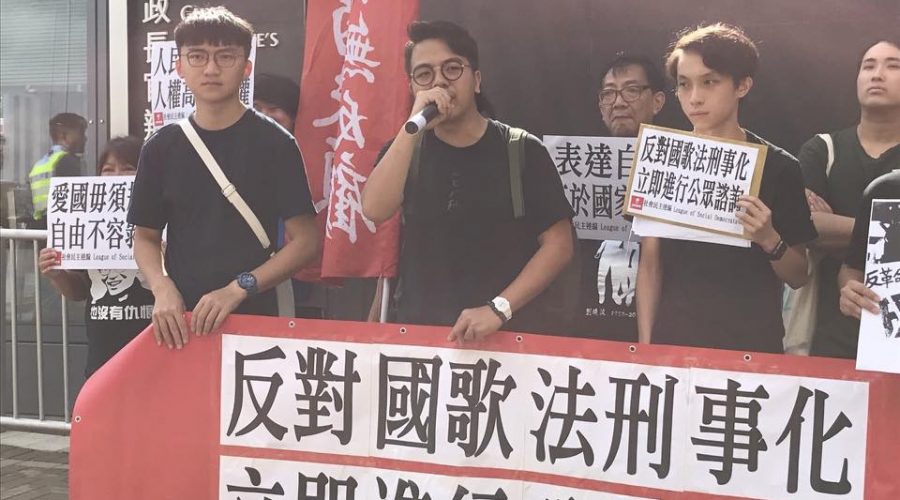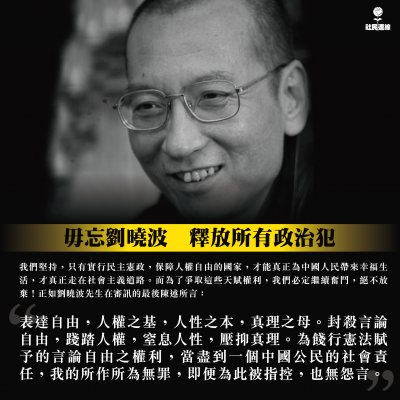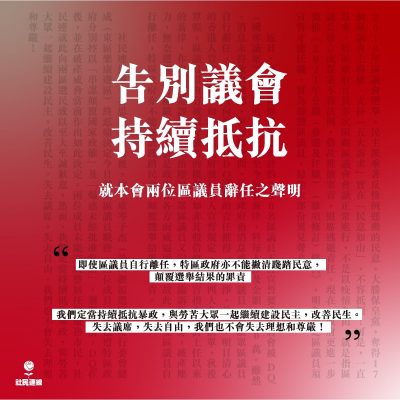
反對國歌惡法 立即進行公眾諮詢
【國歌法聯合聲明】
我們是一群對《國歌法》本地立法存有極大憂慮的團體。2017年內地《國歌法》在香港社會的爭議聲中列入《基本法》附件三後,政制事務局早前公布本地立法的《國歌條例草案》建議條文內容概要(下稱「條文概要」)及召開公聽會作所謂「收集意見」。雖然政制局局長聶德權多次表示市民無需過度擔心立法,但綜觀整份建議條文及政府近月的回應,均無法解答及釋除我們對《國歌法》本地立法的各種問題及疑慮。
違反思想及創作自由
香港市民的思想及表達自由一直受《基本法》及國際公約所保障,根據《香港人權法案》第十六條,「人人都可按其意願抱持任何意見,並有自由通過任何媒介發表自己的意見,提出和接受各種思想和消息」。《國歌法》要求市民尊重國歌甚至「弘揚愛國主義精神,培育和踐行社會主義核心價值觀」,將一套意識形態強加市民身上,違反思想自由;條文概要更指篡改國歌曲譜、歌詞、以歪曲、貶損方式奏唱即屬犯罪,鑒於歷年來均有網民以國歌作為二次創作的素材,《國歌條例》一旦立法,無疑是打壓創作自由。
違反教學自由
此外,《基本法》第136條規定,「香港特別行政區政府在原有教育制度的基礎上,自行制定有關教育的發展和改進的政策」;第137條亦列明,「各類院校均可保留其自主性並享有學術自由」。香港的教育政策從來屬香港自治權範圍之內,中小學的教學內容按既有機制亦一向由老師自行作專業決定,而非由香港政府、甚至中央政府以法律指定。現時德育及公民教育課程文件中,其實已有指引要求各中小學教授學生唱國歌及認識國歌的歷史,如今人大常委通過將《國歌法》列入附件三,強迫香港政府以立法方式規定中小學教授國歌,實在是開啟一個破壞既有制度、剝奪教學自主的極壞先例。
條文含糊、假諮詢
除違反思想、表達及教學自由外, 條文概要建議的條文十分模糊,令市民容易誤墮法網。與《國旗及國徽條例》不同的是,《國歌法》及條例概要均沒有徹底介定何種行為會被視為「侮辱國歌」。根據條文概要中比照《國歌法》第15條,只要「任何人公開及故意篡改國歌歌詞、曲譜,以歪曲、貶損 方式奏唱國歌,或以其他方式侮辱國歌」即可判第 5 級的罰款及監禁 3 年。更嚴重的是,當中「或以其他方式侮辱國歌」的詮釋,可延伸至條文概要中描述的其他本不屬刑事的行為,包括比照《國歌法》第6條的「有損國歌尊嚴的奏唱形式」及第7條的「在奏唱國歌時,當肅立,舉止莊重」。而《國歌法》第7條提及「場合」一詞,但是否所有奏唱國歌的場合,市民亦須「肅立,舉止莊重」,條文概要並無清晰定義,實際執行時必然嚴重影嚮市民日常生活。條文概要如此含糊其詞,實令人憂慮日後會否有人以《國歌條例》以言入罪或思想入罪,引起寒蟬效應,成為政權打壓異見聲音的工具。條文如此模糊,即警察一旦主觀認為某作為(甚至不作為)屬侮辱國歌,已獲法律授權採取拘捕或其他執法行動,變相大幅擴大執法者權力, 有違《基本法》及《人權法案》賦予香港人不受任意逮捕的人身自由與公民權利。條文概要現時建議施加的刑事責任,絕非輕微,一經定罪既會構成刑事紀錄,違者更有可能被判處監禁,如此強迫市民尊重國歌,屬嚴重不合比例。
由去年人大常委將《國歌法》列入《基本法》附件三,到今天政制事務委員會召開公聽會,政府由始至終都未有一個清晰的立法時間表及答覆以釋除市民對於立法的種種憂慮。《國歌法》立法條文牽涉全港市民,任何人均隨時因不了解準則而誤墜法網。對於如此重要的法律,政府竟僅以召開立法會公聽會充當為「公眾諮詢」,無意舉辦任何大型諮詢討論會,意圖將《國歌法》本地立法草草了事,快快通過。條文概要假設有必要刑事化侮辱國歌的行為及強制中小學教授國歌。但是否確有此必要,社會上現時其實並無共識。尤其是刑事化侮辱國歌的行為,並非普世接受的做法,政府有責任解釋為何《國歌條例》立法與國際做法有所不同。如果無事先進行公眾諮詢,公眾將無機會充分討論應否將侮辱國歌的行為刑事化,最後可能違反人民真正的意願,從根本上牴觸普通法刑事法的精神。
因此,我們要求政府應撤回現時的建議文件,立即以白紙草案展開真正的公眾諮詢。
Joint Statement on Local Legislation for the National Anthem Law
We are groups or organizations which are deeply concerned about the proposed local legislation to implement the Law of the People’s Republic of China on the National Anthem (the “National Anthem Law”).
By way of background, the Constitutional and Mainland Affairs Bureau has presented to the Legislative Council Panel on Constitutional Affairs an outline of the proposed content of the National Anthem Bill (the “Outline”) and held two public hearings in the Legislative Council (“LegCo”) after the Standing Committee of the 12th National People’s Congress’s (“NPCSC”) adoption of the decision to add the National Anthem Law to Annex III to the Basic Law in 2017 amongst controversy.
We maintain that nothing in the Outline itself or the government’s recent supplementary responses is capable of addressing, still less resolving, our concerns– despite repeated assurances from Patrick Nip Tai-Kuen, the Secretary for Constitutional and Mainland Affairs, that the proposed law should give no cause for concern.
Taking note that the proposed law:
1) Undermines freedom of thought and creation;
Freedoms of thought and creation of Hong Kong citizens are entrenched by the Basic Law and international conventions. Article 16(2) of the Hong Kong Bill of Rights relevantly provides that “[E]veryone shall have the right to freedom of expression; this right shall include freedom to seek, receive and impart information and ideas of all kind… or through any other media of his choice”.
The National Anthem Law imposes an ideology on Hong Kong citizens by requiring them to respect the national anthem to such an extent that will “promote patriotism, and to cultivate and practice the core values of socialism”. This clearly violates freedom of thought. The Outline further suggests that any person who “alter[s] the lyrics or the score of the national anthem, or perform[s] or sing[s] the national anthem in a distorted or derogatory manner” will thereby incur criminal liability. Since netizens have created and published derivative works of the national anthem over the years, if the law is enacted as presently proposed, it will undoubtedly have the effect of suppressing freedom of creation.
2) Undermines freedom of education;
Article 136 of the Basic Law provides that, “[O]n the basis of the previous educational system, the Government of the Hong Kong Special Administrative Region shall, on its own, formulate policies on the development and improvement of education”; whereas Article 137 of the Basic Law stipulates that “[E]ducational institutions of all kinds may retain their autonomy and enjoy academic freedom. They may continue to recruit staff and use teaching materials from outside the Hong Kong Special Administrative Region”.
Education has always been within Hong Kong’s autonomy. Likewise, the curricula and syllabuses of primary and secondary schools have always, in accordance with established mechanisms, been determined on the basis of the teachers’ own professional judgment, rather than by statutory prescription by the Hong Kong and Central Governments. In fact, the current curriculum documents of the Moral and Civic Education already contain guidelines according to which primary and secondary schools should teach students the national anthem and its history. To now add the National Anthem Law to Annex III, and thence through local legislation compel primary and secondary schools to teach the national anthem, would be setting an extremely bad precedent of undermining the integrity of the established mechanisms and depriving schools of their autonomy in education.
3) Includes use of vague criminalizing language, and is drafted without prior public consultation
The Outline mandates a fine at level 5 and an imprisonment for 3 years for any person who “publicly and willfully alters the lyrics or the score or the national anthem, performs or sings the national anthem in a distorted or derogatory manner, or insults the national anthem in any other manner”. In stark contrast to the National Flag and National Emblem Ordinance, Cap. 2401, neither the National Anthem Law nor the Outline clearly specify what acts are “insult[ing]” to the national anthem. Its scope, if extensively interpreted, may encompass the other non-criminal acts detailed in the Outline, including performing and singing “in a manner harmful to the dignity of the national anthem” and not “stand[ing] and deport[ing] respectfully” at “the occasion where the national anthem is performed or sung” (referencing Article 6 and 7 of the National Anthem Law respectively, which are also drafted in broad and imprecise language). Should citizens stand respectfully at all occasions where the national anthem is sung? What are the legal requirements under the term “respectfully”? Unintended offenses resulting from over-general definitions could be anticipated.
Worse still, the local anthem law could have chilling effects on dissent and become a tool for the government to suppress opposition. The vague statutory language may subject citizens to subjective law enforcement which amounts in effect to an extension of police powers. It, therefore, violates the right to liberty and freedom from arbitrary arrest guaranteed by the Basic Law and the International Covenant on Civil and Political Rights (“ICCPR”), which is entrenched by Article 39 of the Basic Law. Given the hefty criminal penalty, including criminal conviction and potentially even imprisonment, to which an offender may be liable, the proposed law can in no way be styled proportionate.
Lastly, the government has not hitherto provided a clear local legislation timetable or carried out any formal consultation to address the public concerns thus far expressed. The local legislation will affect all Hong Kong citizens; anyone can fall victims to not meeting the legal requirements and commit unintended offenses. Public hearings held by LegCo are no substitute for a formal consultation conducted by the government, not least because it is unlikely that every concerned member of the public can find time to attend such hearings. The government’s reluctance to formally consult the public smacks of an attempt to circumvent proper public scrutiny and implement the National Anthem Law as quickly as possible.
Furthermore, there is at present far from any public consensus as to the necessity of compelling by law primary and secondary schools to teach the national anthem and criminalizing insulting acts towards it, not least in relation to criminalization which deviates from international common practice. All these are still under debate, and should not simply be assumed in favor of the legislation. Without prior public consultation, the proposed law may run counter to the people’s will and will as such fundamental conflict with the spirit of the criminal law rooted in the common law.
We, therefore, demand that the government withdraw the proposal and launch a genuine public consultation by way of a white paper immediately.
發起團體:
社會民主連線
香港音樂導師工會
民間人權陣線 Civil Human Rights Front
香港天主教正義和平委員會
香港藝術家工會 Hong Kong Artist Union
法夢
Progressive Lawyers Group 法政匯思
大專政改關注組
加入聯署:
工黨
職工盟
公民黨 Civic Party
民主黨 The Democratic Party
小麗民主教室
人民力量
香港眾志 Demosistō
文化同行 ARTicipants
精算思政
全民教育局 HKEd4All
藝界起動
社工復興運動
進步教師同盟
保險起動
香港體育關注組
思政築覺
黎梓恩議員辦事處
沙田新幹綫
沙田一隅
護政
思言財雋
本草匡時
民主進步會計師
鍵盤戰線
撐場大聯盟
IT 呼聲
前線科技人員
良心理政
規言劃政
放射良心
杏林覺醒
職療同行
Photo credit: 香港01
——————————————

 港鐵全面減價 高層引咎辭職
港鐵全面減價 高層引咎辭職

